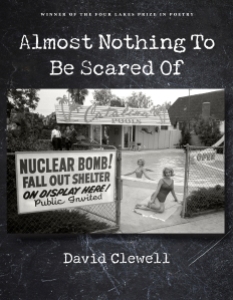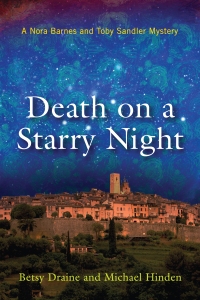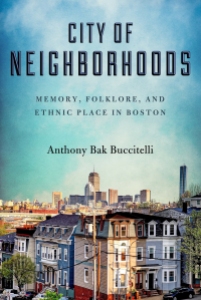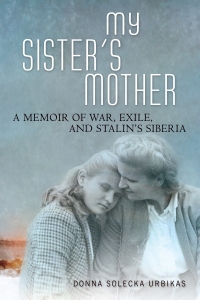
Donna Solecka Urbikas is the author of My Sister’s Mother: A Memoir of War, Exile, and Stalin’s Siberia, published by the University of Wisconsin Press. We talked with her about some of the personal details of her family, childhood, writing process, and experiences as a mother that relate to her memoir.
What inspired you to write this story?
I grew up with these stories because my mother, Janina, never stopped talking about what had happened to her and my sister, Mira, during World War II. They were taken by Soviet secret police from their farm in Poland and sent to Siberia to be forced laborers. Their eventual escape to freedom was a terrible ordeal as well. I had some friends in Chicago with similar backgrounds, but their parents did not dwell on their war experiences. My mother’s intense recollections frightened me as a young child, then annoyed me as a teenager. As a young adult, I became more engaged with my mother’s stories and realized that these war experiences were something people in America knew very little about. It wasn’t until I became a mother myself that my mother finally agreed to let me write about all that had happened to her. I think then she trusted that I would understand her journey.
When did you decide these stories should become a book?
Back in 1985, I started writing only about the war experience— my mother’s and sister’s deportation from eastern Poland in 1940 to a labor camp in Siberia, and my father Wawrzyniec’s capture and imprisonment in a Soviet prisoner-of-war camp. He was a Polish Army officer who had barely escaped being among the 22,000 Poles murdered by the Soviets in the Katyń Forest massacres in 1940. I felt it was important to tell the Polish war story, because in the 1980s Poland was struggling to regain its independence from Soviet control. I had family members in Poland dealing with all that, so I was well acquainted with the struggle, and it seemed like a painful reminder of what my parents had gone through. But I couldn’t finish writing the story until about ten years later.
my mother’s and sister’s deportation from eastern Poland in 1940 to a labor camp in Siberia, and my father Wawrzyniec’s capture and imprisonment in a Soviet prisoner-of-war camp. He was a Polish Army officer who had barely escaped being among the 22,000 Poles murdered by the Soviets in the Katyń Forest massacres in 1940. I felt it was important to tell the Polish war story, because in the 1980s Poland was struggling to regain its independence from Soviet control. I had family members in Poland dealing with all that, so I was well acquainted with the struggle, and it seemed like a painful reminder of what my parents had gone through. But I couldn’t finish writing the story until about ten years later.
How much older is your sister?
Mira was five years old when she was deported with my mother in 1940. I was born several years after the war, so there is a fifteen-year difference between us.

Janina and Mira in India
What does the title of your book mean?
My sister knew our mother before all the horrible things happened to them during the war, whereas I knew only a woman who was haunted after the war. My mother saved Mira many times from starvation and disease. It was really a miracle that my sister survived at all, as most children under the age of five died in those harsh circumstances. My mother used to say that she took her (my sister) in her teeth and saved her. Mira grew up in what was eastern Poland, then in the forced labor camps in Siberia and Russia, and then in resettlement camps in Iran and India. I grew up in the comfort of 1950s America, far from any direct experience with war. Thus, the title, My Sister’s Mother.
How did your family happen to come to America?
My parents had met amidst all the turmoil in Russia after Germany attacked Russia in 1941, and Russia became an ally with Britain and France. With the Polish government in exile in England, there was pressure on Russia to release labor camp deportees and army prisoners. Of course, the Soviets didn’t want to release those workers because they were needed for their hard labor on a very small salary, so my mother and sister escaped. They tried to find the Polish Army, which was re-forming from all the prisoners like my father. They initially met the man who would become my father in the first army camp in Tatishchevo near Saratov. Later they met again in Uzbekistan, where my mother and sister were trying to find their way out of the Soviet Union. My father helped them during a very critical time when they were completely destitute, since the Polish soldiers donated portions of their rations and money to the civilians who were following them. After that, my father went on to fight the Germans with General Władysław Anders in the Middle East and Italy, while my mother and sister ended up in Tehran at a temporary resettlement camp. The British had been helping the Polish Army and Polish refugees. Later, Janina and Mira went to India, where my mother worked as a Red Cross nurse, and my sister attended a convent school. After the war, neither my mother nor my father wanted to return to Communist Poland, so as it turned out they each went to England, and there they met again and married. I was born in England, in Coventry. The conditions in England were abysmal, though, because the British were struggling to recover from the war. So, my parents, sister, and I immigrated to America in 1952.
That history is not well known in the United States. How did you feel about it when you were growing up?

The Polish Army forming in Tatishchevo in 1941, after release from prisoner-of-war camps in Russia and Siberia
As a child, I assumed that everyone had gone through these things, so it surprised me when I encountered American friends who were totally unaware of Poland’s history. It was not history taught during our American education. I only learned about it at home and at Saturday Polish school and Polish scout meetings. Polish history is very complicated, and even today many people do not know that Soviet Russia had attacked Poland only two weeks after Germany attacked on September 1, 1939, starting World War II. When I first began writing the book, people thought I was writing about the Holocaust and Germany’s attack. They were totally unaware that Russia had invaded Poland as well, or that hundreds of thousands civilians like my mother had been deported from what was then eastern Poland to Siberia, for essentially slave labor. My mother had to work in timber operations in the middle of harsh Siberian winters while my sister had to be left alone in the labor camp to fend for herself getting food. Mira’s father had been imprisoned and was not with them.
This story is a romance, too, amidst the terrors of war.
Yes, it is a romance—that two people thrown together in the midst of horrible circumstances would somehow find each other after the war and have another child. They hoped to regain at least some of what had been lost to them in Poland.
Poland did not exist as an independent country during its partitions by Germany, Austria, and Russia for 123 years before World War I. After World War I, Poland regained its freedom. My parents’ generation who grew up between the World Wars was uniquely, stubbornly patriotic and always longed for the Poland that was no more. After World War II, Poland had become the spoils of victory for Soviet Russia in the rush to end the war. It became a completely different country, one in which my parents would not be welcome. My mother’s farm was no longer part of Poland, but was now in Belarus. She had lost all her documents during the turmoil of her escape from the Soviet Union during the war. My father, as a former Polish Army officer, would have likely been deported back to Siberia, where some of his officer friends ended up.
It would be only in 1989 with the fall of Communism in Poland that things changed again, and Poland emerged as an independent country. Though my book is a memoir, readers will learn much Polish and World War II history.
In writing the book as a memoir, you had to face some of your own challenges as well. What were they?

Mira and Janina in Tehran
I really didn’t want to write about myself at all, but the teachers at the University of Chicago classes convinced me that I could not write my mother’s memoir, that it would make a much more interesting story if I included myself. By then my parents had passed away and my children were almost grown, so I began to reflect on how these war events and my mother’s constant reminders of them had affected me. I began to see parallel stories from my own life. My teenage son’s battle with cancer reminded me of how my mother had tried to save Mira so many times throughout the war, and later when Mira suffered from mental illness. The conflicts I had with my mother as I was growing up began to make sense, as I began to understand her from the perspective of being a mother myself. I began to appreciate my parents’ longing for a simple farm life away from the intrusions of city life and their wish to find a connection with life in Poland before the war. I began to understand my internal conflicts with religion, and what it meant to be an immigrant in America, the tug of culture and identity that was being lost in my own life as well as in the lives of my children. I began to forgive my mother for all her craziness, to appreciate what she had gone through. In the end, it was a catharsis for me, as it was for her, to know her story would be told.
What would you like readers to take away from your story?
Certainly, I would like them to know and appreciate the struggles that Poland has had to endure over the course of time and how people like my parents emerged from the turmoil of World War II. It is a struggle that continues, a lesson still to be learned: the effects of war do not end, often affecting subsequent generations in ways that are not easily recognized until it is too late.
Donna (Danuta) Solecka Urbikas was born in Coventry, England, and immigrated with her parents and sister to Chicago in 1952. After careers as a high school science teacher and environmental engineer, she is now a writer, realtor, and community volunteer. She lives in Chicago with her husband. You can visit her website at http://danutaurbikas.com/
 May 11
May 11 May 11
May 11 May 11
May 11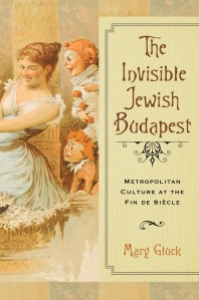 May 25
May 25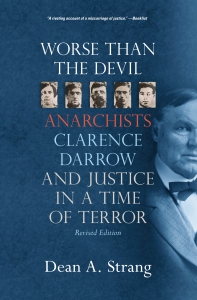 Available now
Available now

 my mother’s and sister’s deportation from eastern Poland in 1940 to a labor camp in Siberia, and my father Wawrzyniec’s capture and imprisonment in a Soviet prisoner-of-war camp. He was a Polish Army officer who had barely escaped being among the 22,000 Poles murdered by the Soviets in the
my mother’s and sister’s deportation from eastern Poland in 1940 to a labor camp in Siberia, and my father Wawrzyniec’s capture and imprisonment in a Soviet prisoner-of-war camp. He was a Polish Army officer who had barely escaped being among the 22,000 Poles murdered by the Soviets in the 


